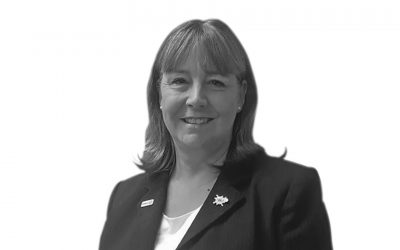It’s not easy. Shades of the BBC quiz show ‘Just A Minute’ with no deviation, hesitation or repetition for just 60 seconds.
The ice breaker for every club meeting of Toastmasters International is called ‘table topics’. Sixty seconds to stand up and speak on a random topic thrown at you.
Listen to this article
As a fresh-faced whipper-snapper 30 years ago, I joined a Toastmasters club at the American air base at RAF Mildenhall, Suffolk. At that first meeting, in front of 20 US servicemen and women, plus a few locals, the table topic was to talk about me.


Toastmasters get given sixty seconds to stand up and speak on a random topic thrown at you
I was jelly-legged. You have roughly 20 seconds, from the time you are given the topic, leave your chair and walk to the lectern, to think of something pithy to say.
I rambled, I was incoherent, I was rubbish. I lasted barely 30 seconds before a round of applause diplomatically concluded my pathetic effort.
But, very quickly, I got better.
The strategy for table topics is to have a punchline. What’s the bottom line of your story? Then, working backwards, use an anecdote to back up the punchline. Think of a smart opening. If you’re desperate, repeat the question for added thinking time.
It’s classic politician training, by the way!
Toastmasters taught me a valuable life skill; how to communicate effectively. You do so by reaching into a toolkit of communication skills; eye-contact, correct stance, vocal variety, appropriate gestures, speech structure, using props, and audience engagement.
At Toastmasters, I once asked my mentor how to overcome the nagging fear before speaking in public. She said: “You’ll never get rid of the butterflies. The trick is to get those butterflies flying in formation.” She was so right.
Fear keeps you constantly on your toes. It nestles alongside a quiet confidence as you carry a toolkit of communication strategies to dip into while looking out at an audience.
It’s why I am so pleased that Rotary International has forged an alliance with Toastmasters International, since the two organisations share such similarities, and whose members can clearly benefit from the different environments.
Some may say they are too long in the tooth to learn new tricks. Really? Surely, one of the reasons we join Rotary is for personal development. What could be a greater skill than improving our communication?
You’ll never get rid of the butterflies. The trick is to get those butterflies flying in formation.”
We have all had to adapt our communication over the past 18 months through Zoom. Effective communication lies at the heart of everything we do.
Think about those times when folk recognise you as a Rotarian and ask what Rotary is all about. It’s not easy to answer in a few sentences, is it? But we should learn to marshal those skills.
Rotarians do great things. We’re project people where actions tend to speak louder than words.
But, for the sake of Rotary’s relevance and the future of our organisation, if we’re not communicating effectively – especially in terms of recruitment – then those efforts are about as useful as a glass hammer!
- Later this year, I am planning to publish a series of articles in Rotary magazine on homelessness, particularly in Great Britain & Ireland. Is your club involved with a homeless project in your community? If so, please email me at: editor@rotarygbi.org
- For the latest updates on what’s happening in Rotary in Great Britain & Ireland follow me on Facebook.


























































